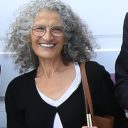Being Palestinian has been complicated for over a century. Today, and in the context of Israel’s genocidal war on Gaza (and intensified violence in the West Bank and Jerusalem), it is fraught with danger. Whereas some of the challenges predate October 2023, the war brought old questions into new focus and raised novel, urgent, and evolving ones: moral, existential, intellectual, and practical. In what follows I will touch on each of them.
My perspective is that of a Palestinian and long-naturalised US citizen, a retired professor of Middle Eastern history, a woman committed to social justice and with the means to engage in charitable giving, and the new Chair of the Board of Trustees of the AM Qattan Foundation, an institution dedicated to education and culture in Palestine and the region. The foundation’s cultural centre in Gaza – at one point brimming with energy, creativity, and joy – now stands damaged and deserted. On one of its outside walls, a signature left by the IDF: the Hebrew word ‘zaam’ (anger) – violent and vengeful – biblical in both meaning and proportion.
Moral issues are inevitably the most subjective and fraught. My early reaction to Hamas’s attack was of fear, anger, and shame. Fear at the certainty that Israel would fiercely retaliate against Gazan civilians; anger that Hamas had handed Benjamin Netanyahu a solution to his legal and political troubles at home and the excuse to wage a criminal war in Gaza; and shame that Hamas had perpetrated violence and death upon scores of Israeli civilians. My sentiments evolved with the war. My fear is now fueled by the certainty of Israel’s genocidal intentions; my anger directed at the State of Israel and its supporters, particularly the United States (as a Palestinian-American and taxpayer); and my shame at the moral failure of governments and institutions all around. At the personal level, I feel anguish at being safe and secure in my Los Angeles home and guilt at being both Palestinian and financially privileged.
There are several aspects to the existential issue including the perils of statelessness in the modern world. As a Palestinian, I have long felt particularly vulnerable to disdain and even hate (akin to the experience of antisemitism now and in the past – ironically). Now I understand what it means to belong to a group under the threat of extinction. The existential threat comprises others, including the criminalising of Palestinian identity (and its attendant impact on philanthropy) and the attempts to erase Palestinian culture and history.
At the intellectual and historical level, Israel’s war on Gaza raises numerous questions. Most salient among those relate to how the war on Gaza inevitably recast the light on 1948, and came to be understood as a continuation of and the logical conclusion to the Zionist project of ethnic cleansing. The war evoked comparisons with other crimes against humanity, including, most poignantly, with the Nazi destruction of the Warsaw Ghetto in 1943. Most difficult are the issues related to the historical imagination: how to begin to conceive of the future. And related to this are the impossibly complicated practical questions of reconstruction and repopulation: how do you rebuild whole cities and communities? Where will the survivors go for temporary shelter and medical and psychological care? Who will nurture and love the thousands of orphans? What can be done right now?
Many of these issues coalesce in and complicate the roles and responsibilities of institutions like the AM Qattan Foundation. Here I highlight three: resources, spaces, and priorities. The resources available to Palestinians, whether at the individual or institutional level are relatively modest and increasingly vulnerable to politically motivated sanctions. How are the Palestinians to shoulder those burdens?
Secondly, the issue of space. The dispersal of Gaza’s civilians and the destruction of their institutions bring to light one of the most challenging aspects of charitable intervention in Gaza (and increasingly in the West Bank): the threatened spaces and mobility necessary for education, cultural practice, intellectual exchange, and the overall development of a free, and free-thinking, civil society in Palestine.
Finally, the war on the Palestinian people has occasioned debates regarding the priorities that should inform Palestinian philanthropy, particularly whether to privilege humanitarian and medical aid over educational and cultural interventions. Yet these dimensions need not always be exclusive as, for example, all the efforts that nurture the minds and souls of Gaza’s children. Indeed, they invite us to hope and in hope we find the strength to make a difference.
Najwa Al-Qattan is Chairman of the Board of Trustees of the AM Qattan Foundation and is emerita professor of Middle Eastern history at Loyola Marymount University in Los Angeles.






Comments (0)